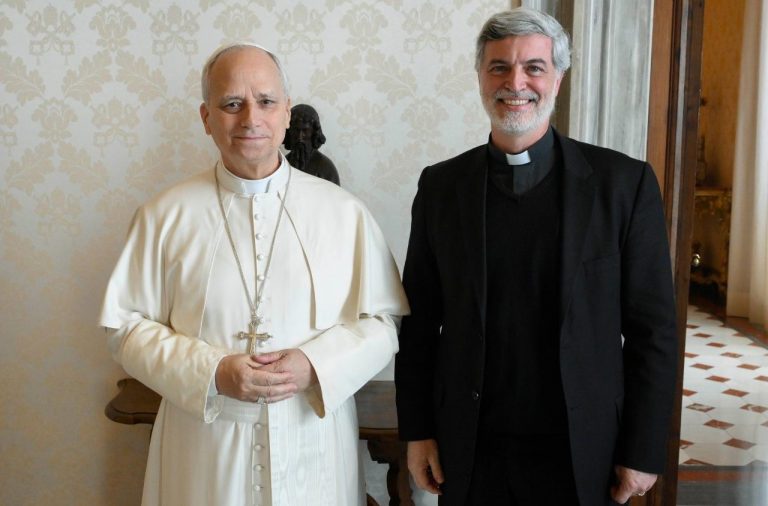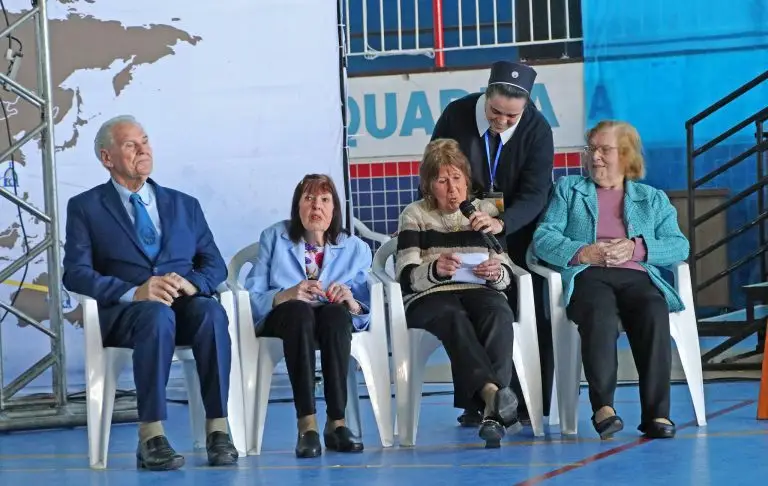The Polish actress, theater, and film director Izabela Drobotowicz-Orkisz created the play “Servant of Mary for the Salvation of Souls” about the servant of God João Luiz Pozzobon. The play has already been performed several times in Poland and was recently made into a film. Drobotowicz-Orkisz has been bringing the lives of saints and blessed people to the stage for years. She has staged these works with deep faith and respect, convinced that portraying such people helps us understand their lives and experience their intercession and spiritual support.
Izabela Drobotowicz-Orkisz’s artistic sensitivity to the value of spirituality, faith, and the lives of the saints is reflected in her art. Therefore, her plays, monodramas, and films bring the audience closer to the saints and encourage reflection on the depth of faith, the meaning of life, and the role of prayer in human life.
Drobotowicz-Orkisz speaks with pride about her work on the play “Sługa Maryi dla zbawienia dusz” (Servant of Mary for the Salvation of Souls). This work, based on documents and materials from Pozzobon’s life, enabled her to get to know his personality better. She emphasizes that João Luiz Pozzobon, despite his lack of education, left behind a great testimony of faith and love for God and people. These characteristics became the starting point for the creation of the script, which inspires not only through its narrative but also through its spiritual depth.
In conversation with Dobromiła Salik and Father Arkadiusz Sosna, she explains why she chose to depict the life of Joao Pozzobon. The artist shares her reflections on her creative work and the spiritual experiences that guided her in realizing the piece about this extraordinary father, husband, and deacon.
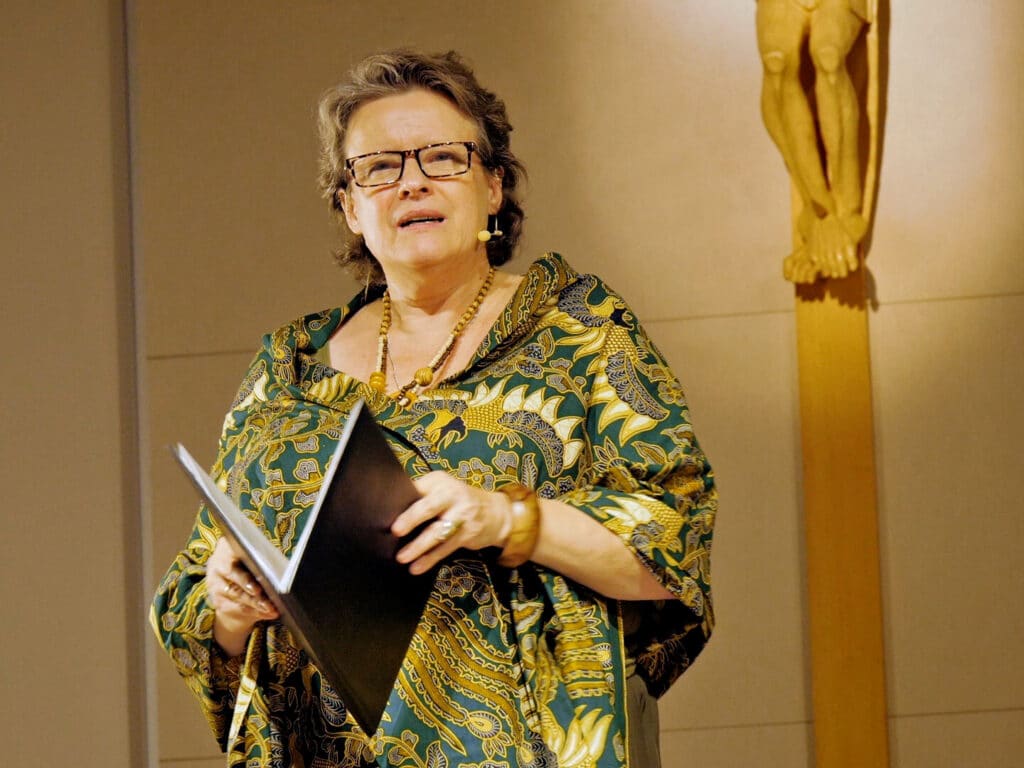
Why did you study the servant of God João Luiz Pozzobon? What fascinated you about him?
Back in autumn 2023, when we were planning the Pilgrim Mother Apostolate meeting, for August 2024, Sr. M. Damiana Czogała asked me if I could make a program or a play about João Luiz Pozzobon. She had seen the film of my play about the Servant of God Jadwiga Zamojska, entitled “One Must Know the Fatherland,” and that inspired her. I said yes if she provided me with material, and I would prefer to incorporate texts of saints, blessed, or candidates for canonization into the script. The book “The Poor Deacon” by Esteban Uriburu, the notes of João Luiz, and various articles from the Schoenstatt Movement formed the basis for the text. I watched films and photos on the Internet and was enchanted by this humble, straightforward, persevering, and faithful man. A man who was not afraid to go into the slums but also to face the bishop for the sake of faithfulness. A layman: husband and father, farmer and entrepreneur, pilgrim apostle.
Could you say a few words about yourself…
When I think of myself in the light of the life of the servant of God João Luiz Pozzobon, I say: I am the eldest child of four siblings. My parents had difficulty providing for us, so I wanted to learn a trade quickly. With great determination and conviction, I began my education at the Technical College of Communication in my hometown of Gdansk, specializing in “Electronic Mathematical Machines”, a very elite subject in 1973. The ethos conveyed by the school patrons was very important to me. Before my A-levels, I studied both psychology and Russian studies. But I had already been involved in the theater circle for years and won many acting awards, and… everything turned out differently. I passed the entrance exams to the State University of Theater Arts in Krakow on my first attempt! But I still remained loyal to psychology. After several years of permanent employment in the state theater, hagiography was added to my passion. I founded my own professional hagiographic theater, in honor of St. Teresa of Lisieux, in Krakow, the city known as the “second Rome of Europe”.
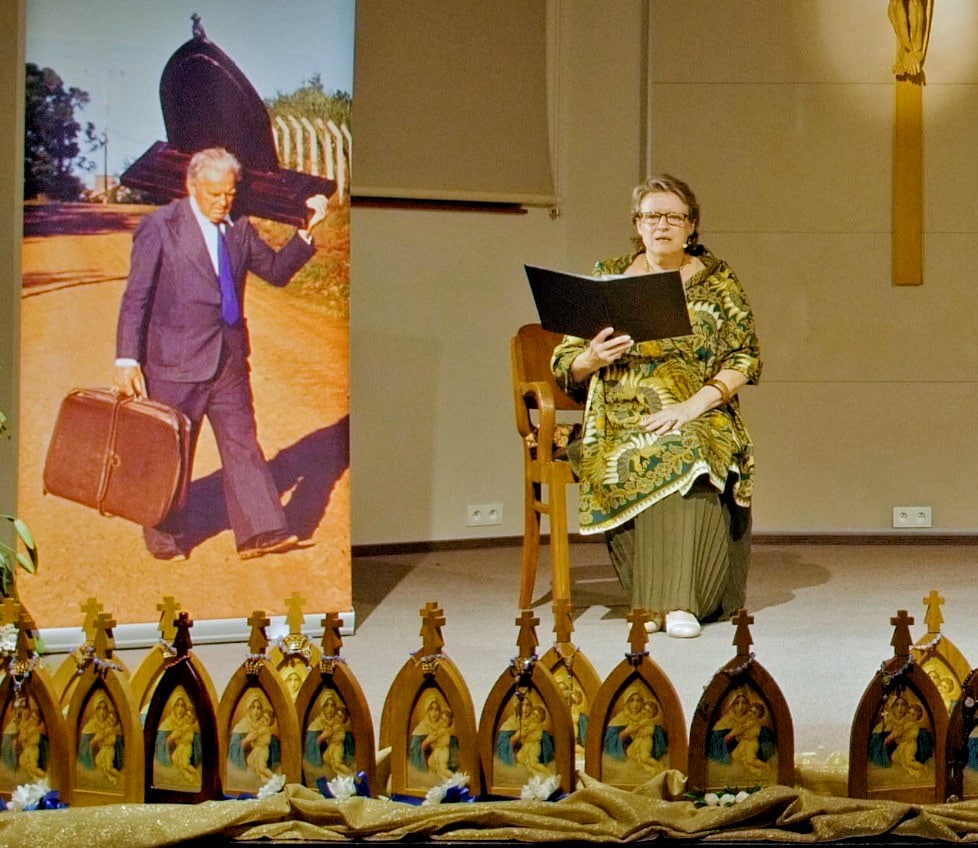
What does the image of the Mother Thrice Admirable mean to you?
I knew it before… In a different frame, this picture hung in the Wojtyłas’ house, and I saw it in the museum in Wadowice. In Siedlec near Krakow, it is in the room of the Servant of God Mother Paula Zofia Tajber, the founder of the Institute of the Sisters of the Most Holy Soul of Christ. I was led to the picture of the MTA by… St. Teresa of Ávila. On the occasion of the 500th anniversary of her birth in 2015, I performed the world premiere of my monodrama “7 Dwellings within the Soul” based on “The Inner Castle” in the Carmelite convent in Krakow. It was a Sunday. I went to mass in the nearby church, and as I was leaving, I saw a Pilgrim Mother pointed out by a woman together with apostolate flyers. And since I am convinced that there are no coincidences but signs from God, I approached her. After a few weeks, Sister M. Damiana gave me a Pilgrim Mother, and after I already had the parish priest’s approval, I founded a circle among my neighbors. I no longer live in that neighborhood, but the Pilgrim Mother still wanders there. I currently have a smaller Pilgrim Mother in my house. I also participated in the Stations of the Cross prayer for the Pilgrim Mother project at the Jasna Góra pilgrimage site. The testimonies of people about the graces they received by praying before this image of the Mother of God are very moving, and some are even shocking. I also feel her loving closeness.
How do you see João Pozzobon in the context of Schoenstatt and the Church?
I think João Luiz is closely connected to Pope Francis’s teachings. Yes, in most parts of the world, the Catholic Church should be “a field hospital,” and João put this into practice. He also constantly bore witness to what John Paul II had called for. A particularly valuable quality for me is that he found a vocation within a vocation: As a husband and father, farmer and entrepreneur, he became a perpetual pilgrim, a servant of Mary.
The play beautifully shows the versatility of this uneducated but very wise person – from his cheerful observation of nature to the dignified way in which he mastered his life and his loyalty to God and Mary.
How was the movie made?
The film was made from footage taken during the premiere of Marek Mika’s play. It was then edited and refined by Maciej Dunin-Borkowski at Studio Katolik in Krakow under my direction. I kept the title I had given the play: “João Luiz Pozzobon – Servant of Mary for the salvation of souls”. I dedicated almost a year of my life to this subject and worked to the point of exhaustion, but I am very happy about it. However, I have transferred all copyrights to the Institute of the Schoenstatt Sisters of Mary, and the Sisters are now responsible for distributing the film.
Did you experience any special graces or new things through the preparation of the play about the Servant of God?
I was focused on my ministry on this topic, but during the work, I realized that a “Pozzobon era” had begun in my life and that I had received many unexpected graces, such as my daughter’s wedding or beautiful family news… At the same time, there were also difficult and painful matters. I trust that João will intercede for us before God.
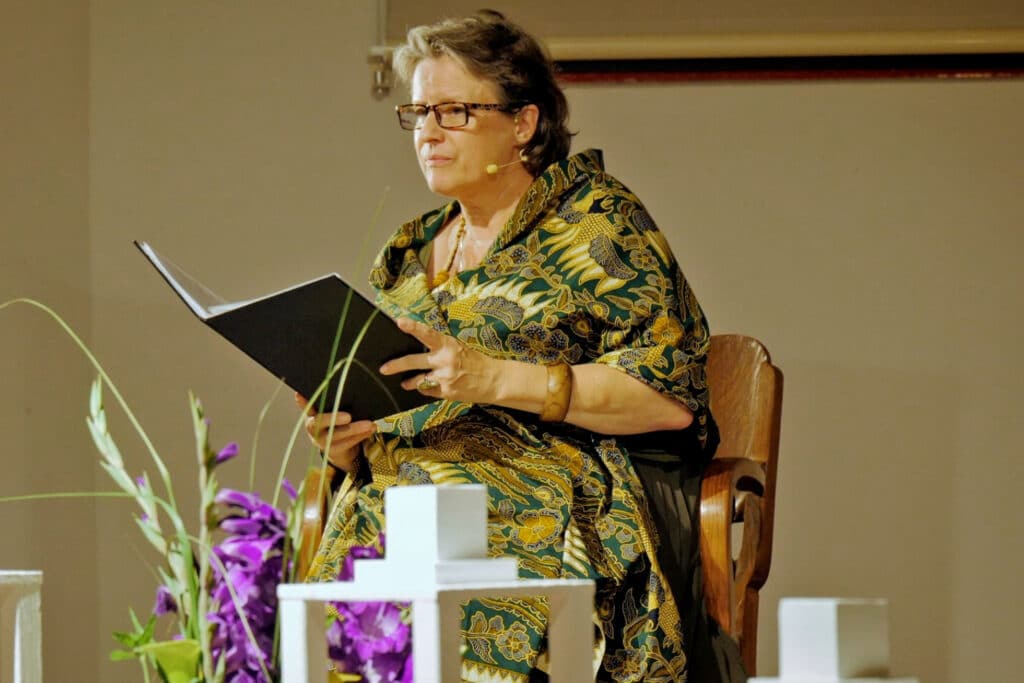
And how did the preparations for the premiere go? Did you perform the play several times?
I have already talked about the structure of the script. The films were selected and edited with great care by Sister Damiana. She also invited a well-known music teacher, Alicja Baczyńska, who took care of the musical arrangement of the play. The first performance took place on August 10, 2024, on St. Anne’s Hill as part of the Forum of the MTA Apostolate for 340 people, and the second on September 20, 2024, in the Provincial House of the Sisters of Mary in Otwock for 120 people. Of course, we did a small dress rehearsal and a draw before the performance!
How do you see the advocate João Luiz Pozzobon?
I will be 67 this year and know you have to live with the end in mind. I can’t yet live every moment as if each of my days were the last of my life… St. Maximilian Kolbe, about whom I did a play at the Hagiographers Theatre, wrote the equation “w = W”, meaning that my will corresponds to the fulfillment of God’s will – and he always strived to make that equation a reality, and I try to live that way too. I think that all Christians need to talk less and act more according to the gospel. And that is exactly what João Luiz Pozzobon shows us. He will certainly stand up for faith and unity in families, for children, in financial matters, for the wise use of nature, and for God’s gifts, and he will help us to live in the truth.
Servant of God, João Luiz – pray for us!
Thank you very much for this wonderful conversation, for sharing the richness of your faith, and for revealing the development of your artistic projects with us.
Biography of the author: Izabela Drobotowicz-Orkisz
Born in 1958 in Gdansk. Wife, mother and grandmother. Actress, theater and film director. Founder and director of the Hagiography Theater “St. Teresa of Lisieux”. Graduate of the drama department of the Krakow PWST – Master of Arts, diploma 1983. Lecturer at the Pontifical John Paul II University and the Ignatianum University in Krakow. Co-founder of the Karol Wojtyła Institute of the Science Foundation, whose theater became a cultural department in 2016. Logophonotherapist.
From 1983 to 1995, she performed on the stages of the Wybrzeże Theater in Gdansk, the Studio Theater of the Agnieszka Osiecka Foundation in Soppot and the Bücklein Theater in Krakow. She has played several dozen roles in classical and modern plays. Her most important film role was that of Bronka in “Dziewczęta z Nowolipek” and “Rajska jabłonia,” directed by Barbara Sass.
In 1994, she left the permanent theater engagement and returned to Krakow with her family. She performed her monodrama “Zamieszkać z Tobą,” based on “Dziejów duszy” by St. Teresa of Lisieux, around 200 times in Poland, Europe, and Canada.
She writes scripts and directs plays and concerts. For over twenty years, she has run her own professional theater for word art in Krakow under the name “Teatr Hagiograf im. św. Teresy z Lisieux.”
Izabela Drobotowicz-Orkisz has been running courses and lectures on voice work and personal presentation since the early 1990s. She works with her own method (logophonotherapy), which combines acting techniques with psychological knowledge. According to Viktor Frankl, she has a certificate in logotherapy from the III. Vienna School of Psychotherapy.
She has been an independent film director since 1998. She received three first prizes at the International Film Festival in Niepokalanów and was also honored at the “Znaki czasu” festival in Łódź in 2004. Her artistic documentary “Pięć tajemnic. Bolesne” celebrated its premiere at the Auschwitz-Birkenau State Museum in 2002. The film mentioned above, as well as “Zamieszkać z Tobą” based on the writings of St. Teresa of Lisieux, the artistic documentary “Konstrukcja nośna. Rzecz o Jerzym Ciesielskim”, “Portrety” based on the works of Karol Wojtyła – John Paul II and radio plays such as “Nie lękajcie się” or “Jeremiasz” are available online.
Translation: Sr. M. Lourdes Macías

